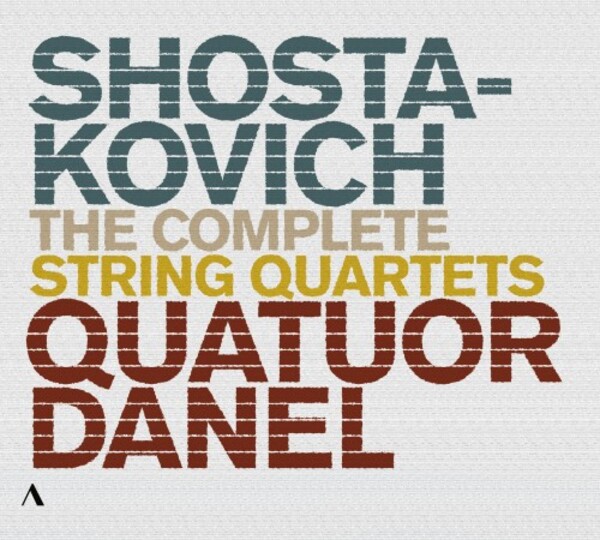SHOSTAKOVICH Complete String Quartets (Quatuor Danel)
View record and artist detailsRecord and Artist Details
Genre:
Chamber
Label: Accentus
Magazine Review Date: 05/2024
Media Format: CD or Download
Media Runtime: 380
Mastering:
DDD
Catalogue Number: ACC80585

Tracks:
| Composition | Artist Credit |
|---|---|
| String Quartets Nos 1-15 (complete) |
Dmitri Shostakovich, Composer
Danel Quartet |
Author: David Gutman
The Shostakovich quartets have moved from the periphery to the centre of the repertoire without too much in the way of ideological reorientation. Unlike the ‘public’ symphonies, these works were seen as personal and paradoxical even as groups from the Soviet bloc were making the earliest official recordings. With British quartets stealing a march on their European rivals, the appearance of a Franco-Belgian cycle in the first decade of the new century was quietly groundbreaking despite leader Marc Danel’s insistence that ‘understanding a repertoire musically is not a question of national origins’. This Fuga Libera set was subsequently reissued on the Alpha label whereas the present release is wholly new, sourced principally from concerts in 2022.
The sequencing of works, formerly a bit of a jumble, is now chronological save for a clutch of bonus items absent hitherto. Last and perhaps least we have the lacklustre Quartet Movement in E flat, sole surviving portion of one of Shostakovich’s aborted stabs at composing a Ninth. The rough draft, discovered as recently as 2003, was unveiled by the Borodin Quartet, whose 2015 player takes its Allegretto indication to imply something rather broader.
It is understandable that the Danel would wish to set down the (extended) cycle afresh, half its membership having changed since the noughties; cellist Yovan Markovitch was the last to join in 2014. Comparable personnel changes sparked a second series from the Brodsky Quartet, the first such remake from a Western group. The recreative fervour of Quatuor Danel burns at least as brightly.
Thanks to close microphone placement in the Mendelssohn Hall of the Leipzig Gewandhaus, one criticism of those earlier budget recordings (made by Bavarian Radio between 2001 and 2005) is likely to be advanced again. There was and remains a tendency to mark key entrances with a sharp intake of breath. That said, the Accentus sound team conjure enhanced sonic glamour from a wider soundstage, incorporating hall resonance while excluding audience noise, flattering the players’ response to every dot and comma. Danel’s own default sonority is sweet but lean when set against that of Mikhail Kopelman, the Borodin’s sometime leader who, the packaging makes clear, has lent his support to the present endeavour. Danel family members attended a Borodin-led course prior to the official formation of a Quatuor Danel. Not that the group has ever been content with mere imitation.
Incessantly touring this music, latterly in tandem with the quartet sequence by Weinberg, has contributed to a shift of focus. Expect less in the way of all-purpose finesse, a feistier edge to the articulation and some retreat from the deliberate tempos previously adopted in slow movements. Gains or losses? The performances certainly feel freshly imagined. For an era suspicious of the appropriation of ‘ethnic’ elements and their sublimation into high art, music as powerful as the Fourth Quartet might begin to seem problematic. The Danel’s current response to its galumphing finale comes closer to a celebration of difference, hyping up the Jewish folk element rather than wryly integrating it into an idiom that naturally gravitates towards modes with flattened scale degrees. The first movement of the Fifth can be played as Beethovenian, a symphonic abstraction. Here its intimidating, KGB-at-the-door qualities are more obvious and the intensity astonishing. You may however wish for something less scratchy and expressionistic for repeated listening. The Allegretto furioso of the Tenth, never easy, is even less so now. Quartets Nos 12‑15 are almost always tauter, nervier than before.
The present booklet includes an extended conversation with quartet members in lieu of work-by-work annotations. This reveals that the group has played ‘quartets like the Third or Eighth roughly 250 times’ yet the musicians never sound jaded because the cycle is perceived as ‘a living body … constantly changing’. While individual interpretations may feel pernickety or abrasive, more or less intimate 20 years on, the sense of four musicians making new discoveries together has not faded. As always ‘authenticity’ is in the ear of the listener. There is every so often a wiriness here that will not be to all tastes. A challenging listen, then, but one bringing abundant rewards.
Explore the world’s largest classical music catalogue on Apple Music Classical.
Included with an Apple Music subscription. Download now.

Gramophone Digital Club
- Digital Edition
- Digital Archive
- Reviews Database
- Full website access
From £8.75 / month
Subscribe
Gramophone Full Club
- Print Edition
- Digital Edition
- Digital Archive
- Reviews Database
- Full website access
From £11.00 / month
Subscribe
If you are a library, university or other organisation that would be interested in an institutional subscription to Gramophone please click here for further information.




